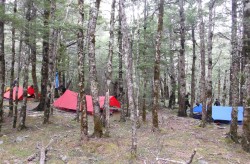Adventure Activity Regulations
The Ministry of Education EOTC Guidelines, Bringing the Curriculum Alive sets the framework for safe operating procedures for all school programmes. However, the Health and Safety at Work (Adventure Activities) Regulations 2016 articulate requirements for the commercial adventure operators for which they are intended and the regulations have implications for schools.
Four Key Messages for Schools
1. Classification of activities & the WorkSafe Register of Adventure Operators
Make sure you know whether any activity you undertake is likely to be classified as an adventure activity. You MUST use a registered adventure activity operator if you utilise contracted expertise through a provider.
Check:
⟹ the Register of Adventure Activity Operators
⟹ What is an Adventure Activity? All commercial providers offering a particular adventure activity MUST be current on the register for that activity. By checking they are on the register, your school can be assured the robustness of the provider's safety management system for the activity in question. This means the school does not need to request an overview of the provider's safety management systems for that activity, thus streamlining your school process.
⟹ Form 6: EOTC External Provider Agreement from the Ministry of Education Tool Kit for EOTC Management. Schools should use this form to guide contracting of all providers.
⟹ From the Ministry Bulletin for School Leaders: Checking an EOTC provider's safety management processes
2. Good practice benchmarks
Any activities covered by the Adventure Activity Regulations are likely to be held up against an auditable standard that will quickly define "good practice" and "practicable steps".
Check and use:
⟹ Activity Safety Guidelines (ASGs) when planning to use activities covered by the regulations.
These are voluntary guidelines that reflect industry good practice for managing safety and are considered a reliable source of good practice information.
ASGs are available for the following activities (note the currency version and check against any downloaded material you may find in your school):
|
Abseiling v3 All-Terrain Vehicles v2 Alpine Hiking ASG v1 Canyoning v3 Coasteering v2 Caving v2 |
Dive v1.2 Heli-Skiing v1.1 High Wire and Swing v3 Indoor Climbing v2 Mountain Biking v1 |
3. School exemption
You are exempt from the regulations unless providing activities to non-students. However, your school's safety management should follow the good practice standard benchmarked by industry.
Check:
⟹ Information for schools (Worksafe NZ)
4. Contractor services
A contractor can provide services to your school without being registered as long as he/she is supporting your program under your safety management plan. If a contractor provides the school with an activity identified as an adventure activity, rather than providing expertise to support the school programme, they need to be a registered provider.
Check:
⟹ Information for contractors and organisations using contractors (Worksafe NZ)
In contracting or hiring instructors to support the delivery of a programme or activity, schools should follow best practice, such as hiring to match the scope of the activity and ensuring the instructor holds a recognised New Zealand qualification that is current.
⟹ To find an instructor go to:
The New Zealand Register of Recreation Providers (NZRRP), or
The New Zealand Outdoor Instructors Association (NZOIA)
Related information
- Adventure Activity Regulations
- Audit Tools
- EOTC FAQs
- EOTC Management Zoom Series
- EOTC Safety Management Plan Template & Toolkit Forms
- Good Practice Guidelines
- Ministry of Education & other agency resources
- Online Learning Modules
- Streamlining school processes
- Working with External Providers
- Planning Safe Water-Based Experiences – On-line PLD
- Fatality Prevention Mindset

